Good Grammar Saves Lives and Other Reasons It’s Important
Your grammar skills, whether good or bad, often leave people with a lasting impression about who you are. Yet grammar errors are still extremely common as they’re so easy to miss. Unfortunately, many grammar mistakes come at the price of being misunderstood, made fun of, or even losing a job.
Luckily, poor grammar skills can be fixed as long as you’re aware of them. This article will show you how even a little mishap, like adding one comma too many, can change the meaning of the whole sentence — and explain how to avoid it.
The 5 Most Dangerous Grammar Mistakes
Experts agree that incorrect grammar is very quickly becoming a modern-day epidemic. With the growth of social media and text messaging as well as the use of abbreviations, slang, and social media, it’s not surprising that an increased number of people sacrifice grammar in order to get their message across quicker.
The first step to improving your grammar skills is realizing what common errors you’re making. Although the list is quite extensive, here are the top 5 grammar mistakes that go overlooked.
1. Questionable Commas
Often deemed unimportant, the comma is actually an extremely powerful grammar tool. Its sole purpose is to show where a reader can pause to take a breath and take time to understand the text. However, positioned in the wrong place, commas (especially Oxford commas) can completely alter the meaning of a sentence.
Missing in Action: Regular Commas
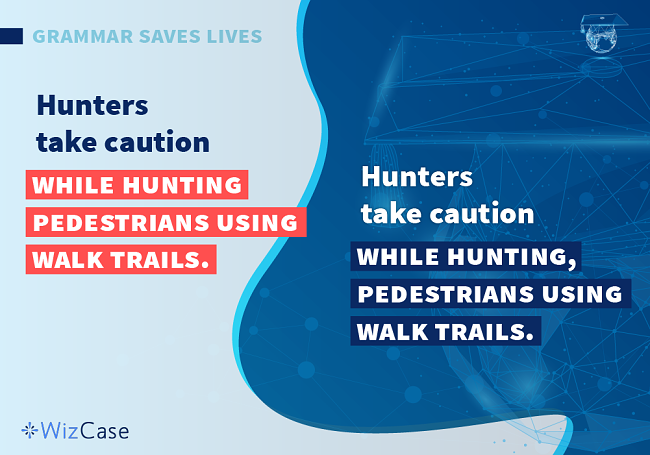
Forgetting about regular commas can quite literally create extremely dangerous situations. For example, stumbling across a sign that says “Hunters take caution while hunting pedestrians using walk trails” would probably cause you to run away or hide. That’s because it tells hunters to take caution while trying to shoot people walking by. Adding just one comma in the middle would protect many passers-by through providing a warning for hunters to be extra careful and not hurt anyone using the walking trails.

Missing commas can even portray you as a serial killer or a cannibal! Regardless of your intentions, saying “We’re going to learn how to cut and paste kids!” would probably force many concerned parents to call the police. Good luck trying to explain to the officers that you weren’t planning on taking out a knife during a class. A comma at the end of that sentence wouldn’t just make it clear you were addressing children — it could keep you out of prison as well.
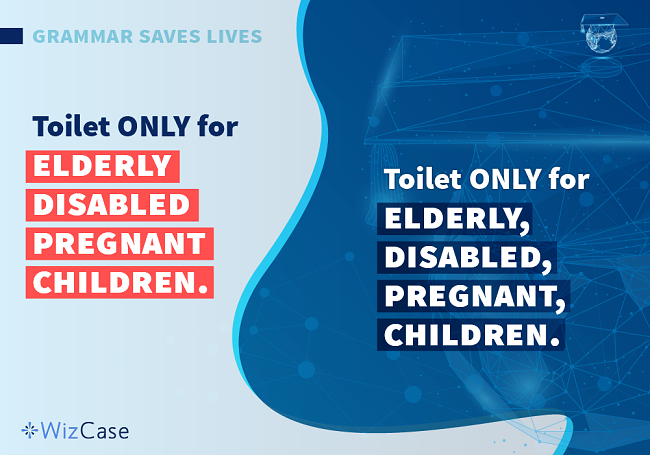
The lack of punctuation can cause an endless list of uncomfortable situations. Imagine you were desperate to use the toilet in a restaurant, but the sign on the door said “Toilet ONLY for elderly disabled pregnant children.” It sounds like its use is restricted to children who are both elderly and pregnant, and disabled on top of it all. However, the addition of commas changes the meaning of the sign, allowing entry for the elderly, kids, disabled people, and pregnant people.
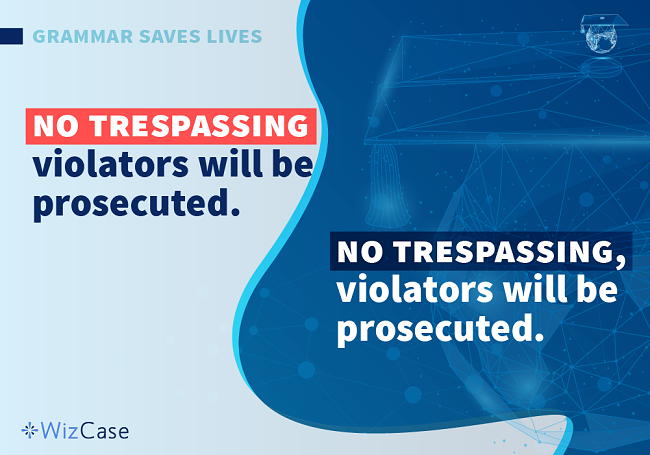
Omitting commas in sentences may quickly turn pedestrians into criminals. After all, many people might be tempted to break the law if they knew there wouldn’t be any consequences. Writing “No trespassing violators will be prosecuted” allows everyone free entry on the premises without any repercussions. Yet if that sentence had a comma, anyone trespassing is subject to the law.
Misplaced Commas
After seeing how omitting commas can put you in trouble, you may be tempted to put them everywhere just in case. Unfortunately, this grammar mistake can still lead to confusion.
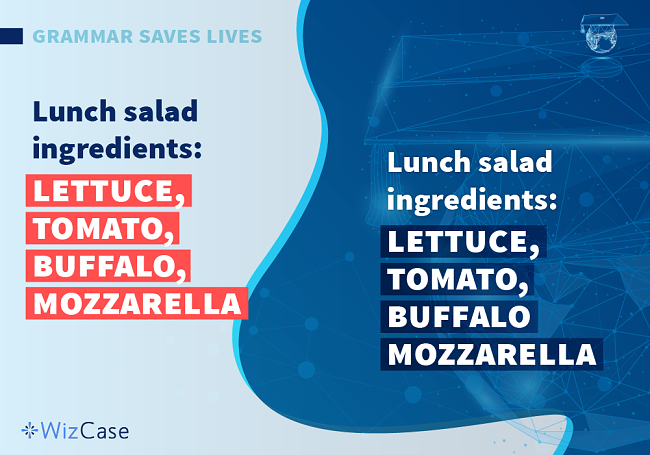
This meal description is a little misleading, especially if you’re a vegetarian. How often is buffalo meat part of a salad? More importantly, how is it cooked? This ingredient list poses more questions than answers. However, remove the last comma and suddenly all you’re ordering is a commonly-known 3-ingredient salad!

Let’s say you want to protest against seal hunting. You make your sign to show your support, but accidentally put a comma in the middle of it. This suddenly directs your message at baby seals, not hunters. More specifically, the sign would tell the little animals to stop partying, which differs a lot from banning acts of animal cruelty.
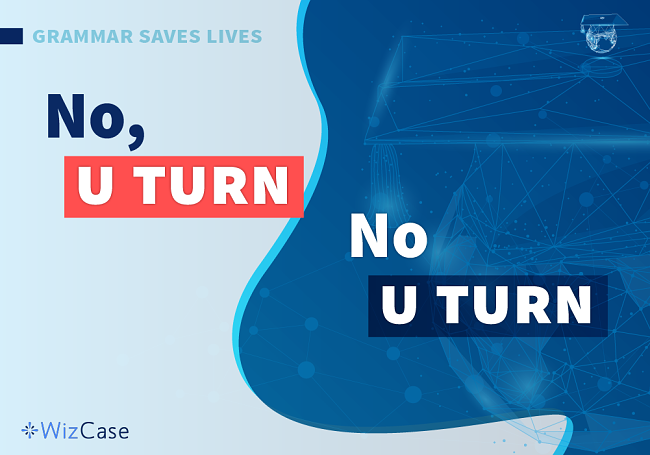
Road signs exist to make roads safer and organize moving traffic. However, some signs seem to argue with drivers rather than display the rules of the road. “”No, you turn.” “I don’t want to turn, you turn.”” If that comma didn’t exist, drivers could easily reroute themselves rather than amping up for a fight with an inanimate object.
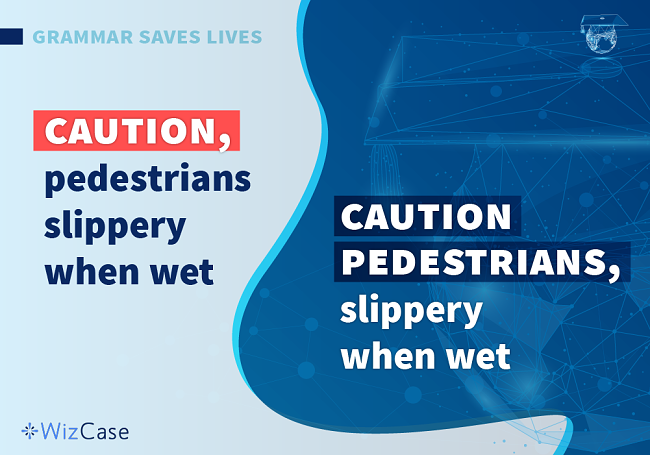
We’ve all seen signs that warn people of wet floors — whether in a shop, hotel, restaurant, or on the street. However, these signs seem to be warning about slipping on wet people instead. Unless you were planning on informing others to be careful while walking on wet pedestrians because they’re slippery, add a comma to prevent people from falling on wet floors. It might also save you a lot of money on compensation should they sue you for inadequate warnings.
Controversial Oxford Commas

The Oxford comma is arguably the most controversial grammar rule — and it divides most English speakers. Regardless of how you feel about it, adding it at the end of a list of two or more can make a great difference in how others understand you. Without it, Nelson Mandela suddenly becomes an immortal half-god who collects toenails in his spare time, which is far from the truth. However, with the Oxford comma at the end, that same sentence describes an encounter with 3 separate people — Nelson Mandela, a demigod, and a toenail collector.
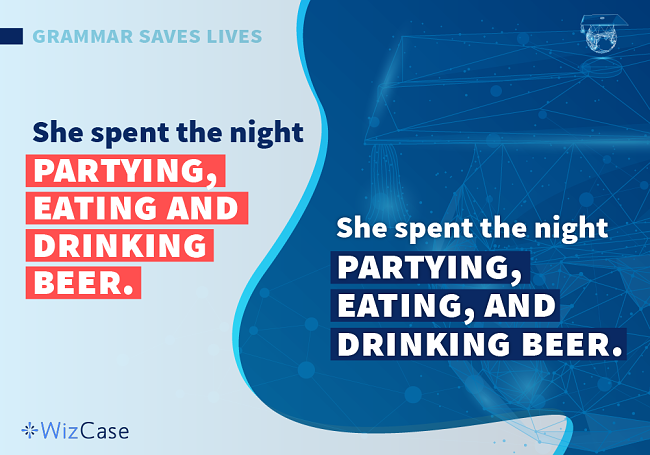
Let’s say you’re describing to someone how your sister spent the weekend. At first glance, it looks like she was not only drinking beer, but also eating it. While hungry college students are known to devour just about anything, it’s highly unlikely she was consuming beer in solid form. Add that final comma in and it becomes clear that your sister was in fact partying, eating, and drinking beer — which is a lot more believable.
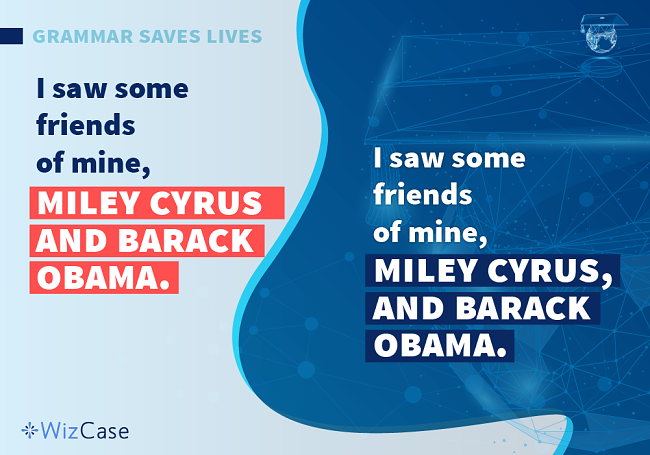
Now, let’s reverse the situation so that you’re telling someone about your weekend. With the Oxford comma, a simple sentence, “I saw some friends, Miley Cyrus, and Barack Obama” could cause a lot of excitement, but it doesn’t sound impossible. Yet without it, that same statement would make someone think you’re friends with Miley Cyrus and Barack Obama! So whether you graduated from Oxford University or not, the Oxford comma should still be a part of your daily grammar to avoid general confusion and uncomfortable situations!
A misplaced Oxford comma may even cost companies millions of dollars. In 2018, a dairy company from Portland had to pay $5 million when it was sued by three of their lorry drivers for missed overtime payments. The men argued that they weren’t excluded from the extra payment as the law didn’t specify delivery drivers as exempt from it. This all could have been avoided if there was an Oxford comma in the state’s law, which stated that no overtime pay was required for staff involved in: “the canning, processing, preserving, freezing, drying, marketing, storing, packing for shipment or distribution.”
2. Possessive Apostrophes
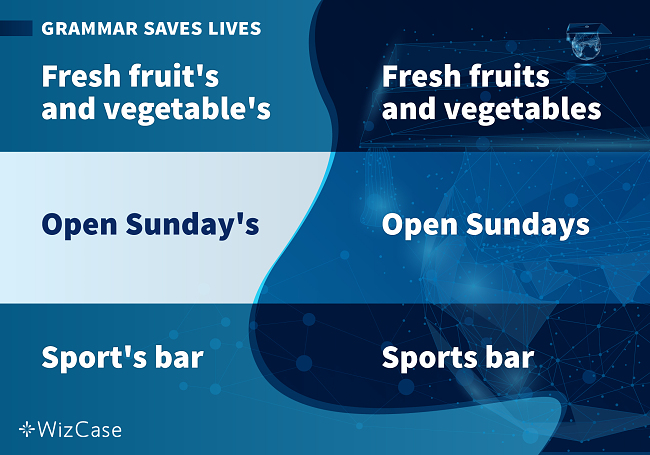
The use of an apostrophe has caused a lot of confusion in recent years, even leading to many organizations and companies removing it from their names. However, that doesn’t make that hovering comma any less important. In fact, people are more likely to perceive you as less intelligent if you misuse an apostrophe compared to misusing a comma.
The rule behind apostrophes is very simple. If you’re indicating possession (as in something belongs to someone) or contraction (like “it’s” or “won’t”), an apostrophe is a must. If you want to talk about something in its plural form, then avoid that punctuation mark at all costs. Otherwise, a shop sign that informs customers about weekend opening days should say “Open Sundays” (not “Open Sunday’s”) as it’s open every Sunday in the year.
Similarly, a “sports bar” is a place where you can go to drink beer and watch various sports games with your friends. Going to a “Sport’s bar” wouldn’t really make sense unless the owner of the bar’s name is Sport. A grocery store should pride itself on selling “fresh fruits and vegetables” not “fresh fruit’s and vegetable’s” because apples and cucumbers can’t really be in possession of anything. It’s just a plural form to make it clear that the shop has more than one fresh fruit or vegetable in stock.
3. Suspicious Quotation Marks
Quotation marks are extremely useful when you’re quoting or referencing someone in your text. They allow you to talk about book and movie titles without confusion. They can even be used to highlight sarcasm in a simple sentence, for example, “Sure, I really “enjoyed” being dragged into the karaoke bar.” However, placing them randomly in a normal sentence often undermines what you’re trying to say. That’s because misplaced quotation marks allow readers to take what you’re saying as a suggestion or sarcasm.
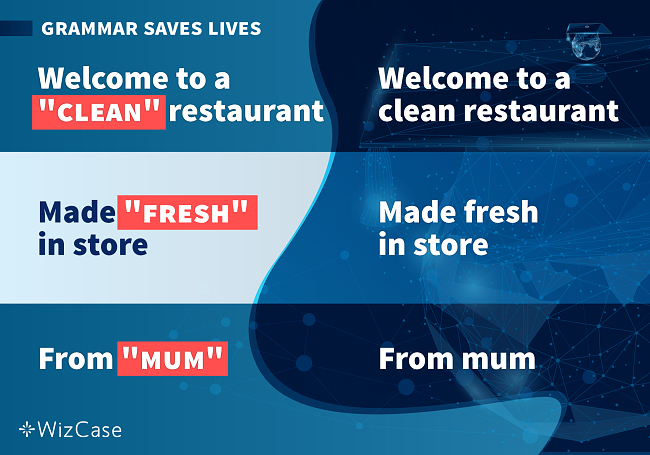
For example, receiving a birthday card signed “From “mum”” could make you wonder if it actually came from your mother. You’re also likely to hesitate before buying anything with a label “Made “fresh” in store” as it sounds like it wasn’t actually made fresh. If you saw a sign with ‘“clean” restaurant’ written on it, you’d probably turn around and never go back as no one wants to eat in filth.
So unless you’re specifically quoting someone or you’re trying to be sarcastic, don’t overuse quotation marks — in most cases, they’re not necessary.
4. Aggressive Exclamation Points
Generally speaking, exclamation points are used to express heightened emotions, like anger or excitement. Most readers automatically perceive sentences with more than one exclamation point as angry shouting. Therefore, excessive use of exclamation points can be quite overwhelming and the meaning you’re trying to get through is likely to get lost.

For example, if you post a vacancy ad that says ‘Help!!!!! Wanted!!!!!’, anyone reading it might assume you’re in immediate danger, not looking for a receptionist. While you may have been trying to highlight the urgency of the ad, you’re sending a different message altogether.
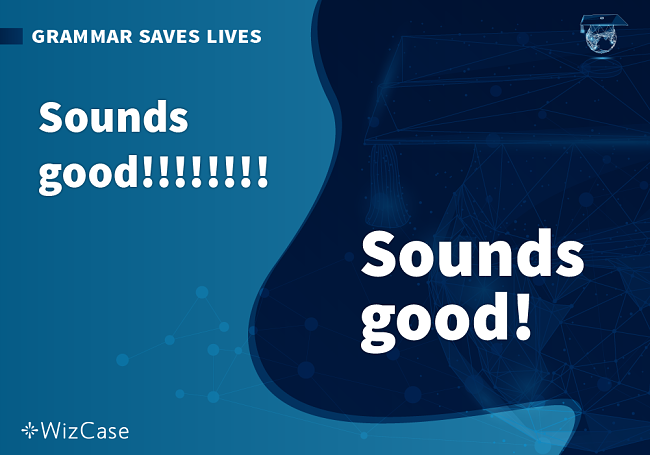
Interestingly, due to social media, the excessive use of exclamation points is being normalized. People feel the pressure to make sure their emotions are clear in plain text so they add multiple points at the end of their sentences. Suddenly, responding with “Sounds good” doesn’t portray as much excitement as “Sounds good!!!!!!!!” Similarly, “You’re the best” wouldn’t be genuine without 5 exclamation marks at the end — because how do you tell someone what they mean to you if you can’t shout it out to them?
Despite being more accepted on social media, remember to avoid using exclamation marks excessively in formal and academic writing.
5. Confusing Contractions
The English language loves to put multiple words together and turn them into contractions. They’re commonly used in everything from daily speech, to movies, newspapers, and even instructions.
Contractions are created by swapping certain letters with an apostrophe. Knowing which letter to replace can seem difficult at first, but there’s only one simple rule you should follow to create them. If contractions are made of two separate words, then the apostrophe replaces any letters that aren’t a part of it. For example, “you are” can easily be turned into “you’re” — in this case you’re swapping the ‘a’ in “are” for an apostrophe. In “does not,” it’s enough to replace ‘o’ with an apostrophe to create “doesn’t.”
Don’t worry if you find it difficult to understand at first. Many native English speakers themselves struggle to know how to use contractions — it’s especially visible on social media. It also seems that it’s the distinction between certain contractions and possessive pronouns that are the most difficult to differentiate. These include the constant battle between “your” and “you’re,” “its” and “it’s,” and “their,” ”they’re,” and “there.”
Unfortunately, missing apostrophes can also result in a catastrophe. As they’re a necessity in contractions, omitting them can sometimes create a completely new word. For example, a simple “we’ll” (we will) can quickly turn into a “well,” “she’d” (she would) into a “shed,” or “we’re” (we are) into “were.” Luckily, this is only the case for a selected few contractions, which makes it a lot easier to remember.
Be careful! Avoid using contractions in formal situations and academic writing. They can be perceived as highly unprofessional.
Your vs. You’re
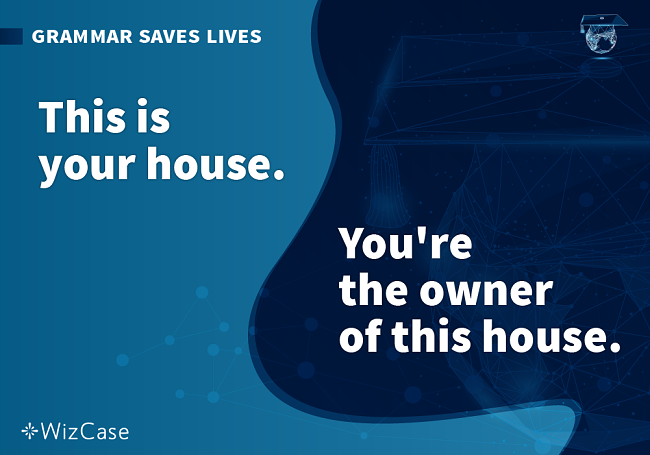
“You” is a possessive pronoun used to describe something that belongs to you, such as your dog, your house, your mum, your face, and so on. “Your” is almost always used with a noun which describes an object, place, or person you may “own.”
On the other hand, “you’re” is a contraction of two words — “you” and “are.” It’s always used to describe a state of being and is usually followed by a verb that ends with -ing or an adjective to describe who you are. For example, “you’re going home,” “you’re shaking,” “you’re annoying,” “you’re funny.” It can function as both the contraction and separate entities but it’ll still have the same meaning.
People tend to mistake the two and use them interchangeably, despite the fact that they mean two completely different things. Whenever you find yourself unsure of which one to use, try to replace each “your” and “you’re” in your text with “you are.” If it makes sense, then it’s definitely the latter you should use.
Its vs. It’s

Mixing “it’s” with “its” is another prevalent grammar mistake. It could stem from the fact that “it” is used when talking about inanimate objects or ideas, which is much more abstract than talking about people. However, the “it’s” vs. “its” rule is just as easy to understand as “your” vs. “you’re.”
“Its” should be used when you’re talking about a possession or that something belongs to something else, for example “a car and its wheels,” “its power supply,” and so on. It may be tempting to add that apostrophe as most of the time the English language requires you write ‘s’ at the end of the word to indicate ownership (i.e. Mary’s flowers, my dad’s car). However, personal pronouns (such as yours, hers, and theirs) don’t need the apostrophe within them because they’re already showing someone’s possession.
“It’s” is a contraction of either “it is” or “it has,” depending on what you’re trying to say. To decide which one to use, check if you can replace it with “it has” or “it is.”
Their vs. They’re vs. There
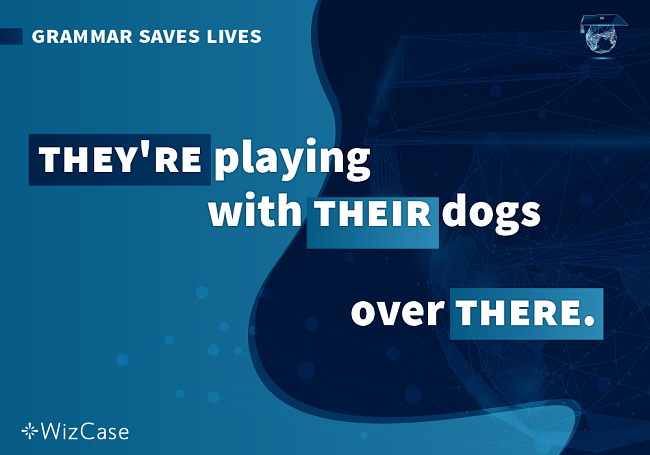
By far the most confusing distinction, the of “their” vs. “they’re” and “there” is extremely common. The three words sound exactly the same, but each one has a very different meaning.
Let’s start with the easiest one. “They’re” is a contraction of two words that describe a state of being — “they are.” It’s usually followed by an adjective to use as a description or a verb that ends with -ing.
“Their,” just like “your” and “its,” is a possessive pronoun that shows something belongs to a group. It’s generally used in a plural form (i.e. when talking about more than one person), but can sometimes be used when talking about someone whose gender you don’t know, for example, “someone forgot to take their jacket today.”
Finally, “there” points out a place far away from you. Essentially, “there” works as an opposite of “here,” for example “I left the book there.” Additionally, “there” can be used to introduce a subject of a clause or a sentence, such as “There is my favorite person!”
There’s an easy rule to quickly distinguish between all three words and the clue lies within them.
- “They’re” comes with an apostrophe which indicates a contraction of two words.
- “Their” describes possession as it’s got the word “heir” inside of it.
- “There” has “here” in it therefore it points out a place or a position.
The Repercussions of Bad Spelling
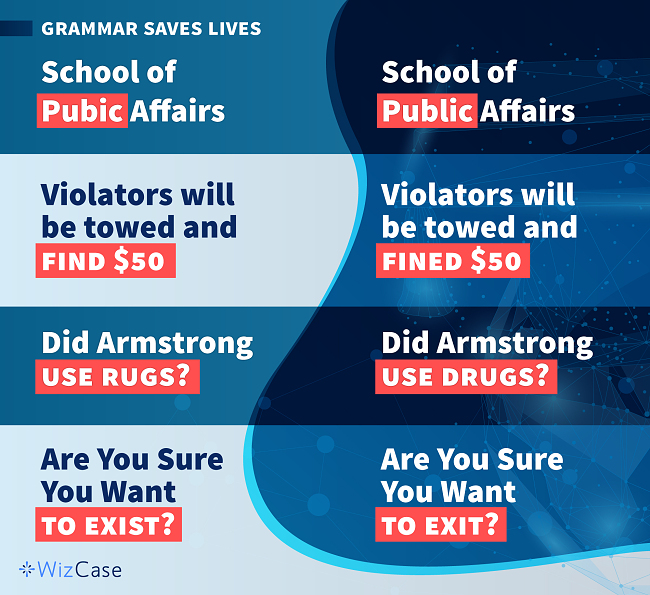
Making spelling mistakes is arguably a part of human nature. As annoying as it can be for the person misspelling a word, these errors usually become the topic of jokes. For example, a renowned American School of Public Affairs that forgot to spell-check its sign is now commonly referred to as the “School of Pubic Affairs.” Misspelling parking signs can result in major financial losses if each one allows its violators to find $50 instead of handing out fines. Forgetting just one letter in a news report accused Armstrong of winning with the help of rugs, not medication. It’d also be extremely concerning if each computer program asked you if you wanted to exist every time you shut it down.
Unfortunately, spelling mistakes can also be used by cybercriminals. So called typosquatting (or URL hijacking) is a common form of cyber attack that targets people who misspell a site address in their web browser. As these errors happen quite often, hackers started creating malicious websites mimicking URL names. These look-alike sites are set up to gain a visitor’s trust and collect their personal information, such as Social Security Numbers, bank account details, or credit card credentials.
Typosquatting can even lure its targets into various fraud cycles by displaying believable error messages about their devices. The unsuspecting victim then follows through with the pop-up message that allows hackers to infect their device with various types of malware.
To avoid becoming a victim of typosquatting, pay extra attention to the URLs you input in your web browser. While most of the time the wrong URL won’t work, you shouldn’t risk your personal safety by accidentally misspelling anything.
Why Grammar Is Still Important
Proper punctuation and spelling make a difference in clear and concise communication. However, grammar is so much more than just correctness — it’s an art in and of itself that allows us, as humans, to freely express how complex our minds are. Unfortunately, it’s also an art that an increasing number of people tend to dismiss as unimportant and unnecessary. Yet studies show that grammar still has a big impact on people’s lives, especially in professional settings.
A study carried out by Grammarly shows that there is a correlation between your grammar skills and your career. Profiles with a few or no errors performed significantly better within the job market and were offered higher positions than those who displayed poor grammar. Professionals who use proper grammar are also more likely to continuously look for new challenges and opportunities for professional growth. Meanwhile, those with poor grammar skills are more likely to settle for the same position for a longer period of time.
Fewer grammar errors could also be linked to more promotions. People with better grammar climbed the career ladder a lot quicker than others, even if they had the same level of education. That’s because employers judge your intellect, analytical skills, and attention to detail through your grammatical abilities. Too many errors, however small, will make people perceive you as lazy and sloppy. Not to mention that bigger errors will undermine your credibility and make people more reluctant to believe anything you say.
Even though the study focused on a small sample of 100 people, it’s clear how important good grammar skills still are when it comes to looking for a job or getting a promotion.
6 Steps to Improving Your Grammar
English grammar is extremely tedious and difficult to master, whether it’s your native language or not. Luckily, it’s possible to learn it as long as you put in the time and effort to practice! Committing every day to even just one of the steps below will improve your grammar skills in no time.
1. Read as Much as Possible
Analyzing written text is one of the best ways to improve your grammar skills. The visual representation of actual grammatical rules will make it easier for you to understand and remember them. Apart from enforcing proper grammar use, reading helps with correct sentence structure and your writing fluency. If you’re just starting out with learning proper grammar, stick to easy texts like children’s books. You’ll be able to increase the difficulty level as your grammar skills develop.
2. Listen to Others
Another great way to improve your skills is listening to how other people speak. Try to hear how people structure their sentences and where they pause. You don’t just have to listen to people you know either — any conversation around you or even watching an English movie will benefit you. You’ll be surprised at how much you can learn just from hearing others speak.
3. Play Online Grammar Games
Playing games stimulates your brain. Doing so to learn or master English provides you with a more entertaining way of studying. Various online grammar platforms (like Free Rice or Games To Learn English) encourage you to practice your skills through a multitude of different games aimed at learning different grammar rules. They’re available online and can even be accessed from your phone!
4. Proofread Out Loud
Whenever you write, always check for any mistakes by reading out loud. Actually saying the sentences will allow you to hear the errors as they happen and correct them. Pay extra attention to where you need to pause to take a breath or when sentences are too long and complicated to understand. This is something even expert English writers do as mistakes can easily be missed if you’re just skimming through a text.
5. Download a Grammar App
Your phone can be your greatest tool for maintaining good grammar. App stores offer a vast choice of apps that help you develop proper use of the English language, such as Duolingo or Johnny Grammar Word Challenge. Some correct your text as you write, provide educational games, or even offer quick lessons on various grammar rules.
6. Attend English Classes
Finally, it might be a good idea to enroll in additional English classes. It’ll give you a great opportunity to ask questions, practice with other students, and use newly-learned skills in various situations. English tutors are also able to spot any existing mistakes in your grammar and explain to you how to fix them. Going to a class can give you a massive confidence boost to actively practice English every day on your own.
Grammar Can Save Your Life — Use It Wisely
In many situations, people are likely to make assumptions about you based on your grammar skills. A single email, business letter, job application, or even a post on social media may make you look extremely smart or quite uneducated. Luckily, it’s entirely up to you which impression you’re going to make. Regardless of your current grammar skills, you can always grow and improve them with practice and effort.



